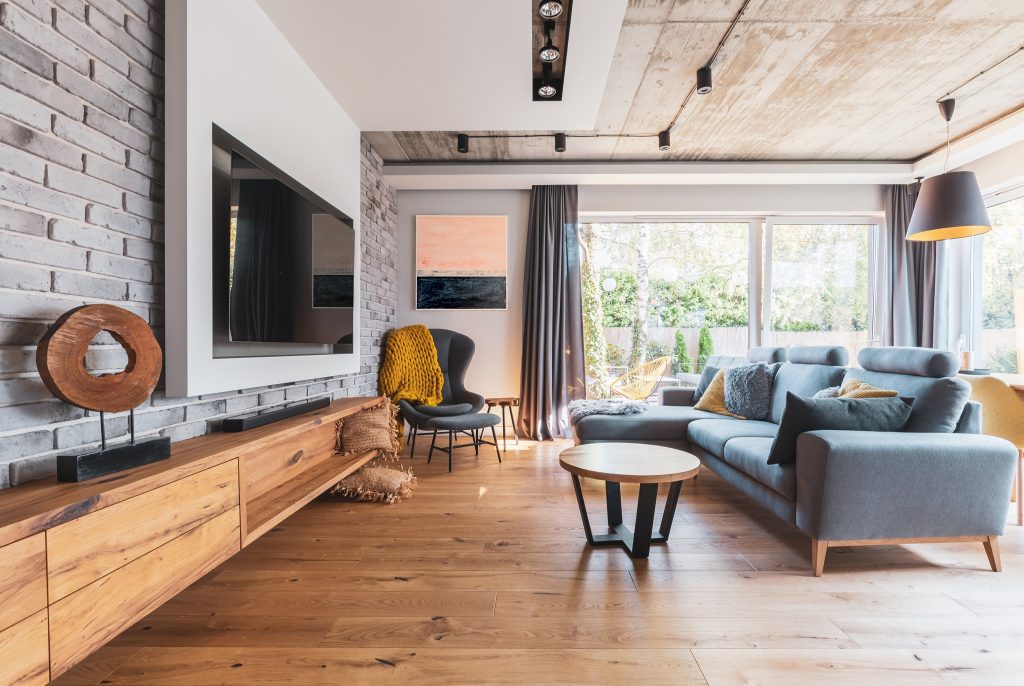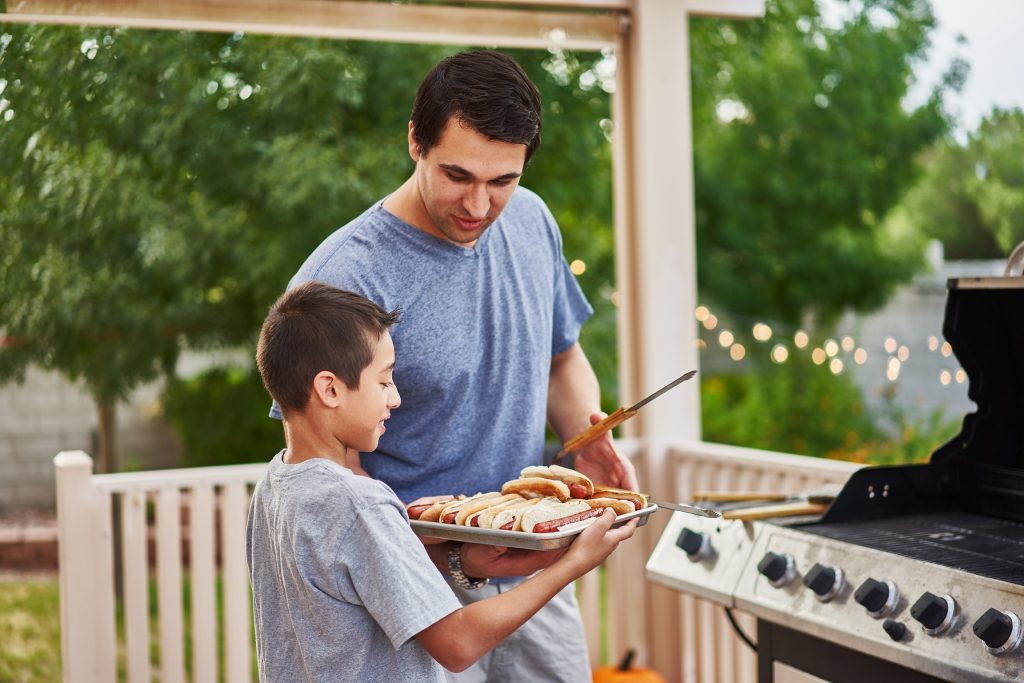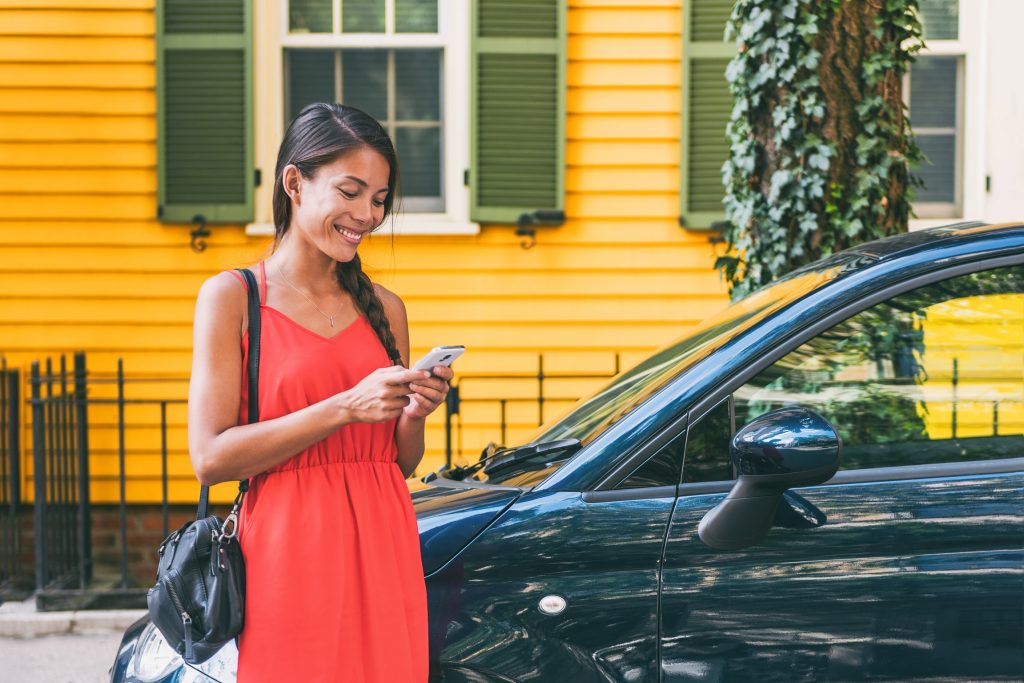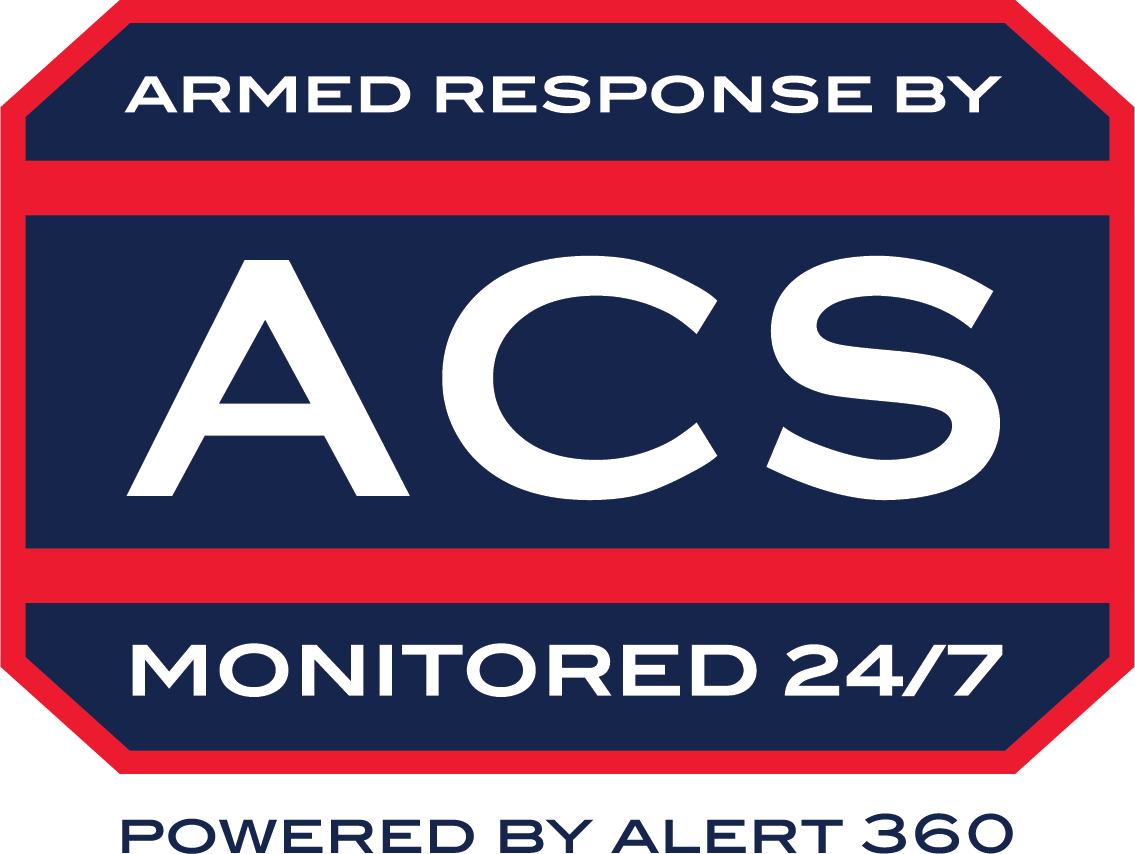
At ACS Security, we understand that there are a lot of dangers in this world and your home safety is important. Luckily, it doesn’t take much to protect what matters most. Ensure your safety by paying attention to a few simple daily steps. Following these guidelines will give you greater peace of mind and enhance the security of your home and family.
Start with the Basics

When it comes to the safety of your family, it’s best to start with the basics. Here are some simple areas of your home to keep in mind as you begin amping up your home security.
Entrances
- Lock all doors every time you leave.
- Check through your peephole before answering the door.
- Change all the locks when you move in.
- Consider adding a video doorbell.
Windows
- Keep your windows locked at all times. If you open a window for fresh air,
make sure to lock it when you are finished. If windows don’t have locks, install some. - Never leave home with a window open.
- Trim back any trees or shrubs that are near your windows.
Outside Lighting
- Keep your front and backyard lit with motion-activated floodlights that can alert you to unwanted guests and deter burglars.
- Trim back any bushes or trees that can block line of sight from a window or door, as well as block light from installed floodlights.
Arm Your Home Alarm
- Install a home security system. This can include a control panel, motion detectors, glass breaks, smoke & carbon monoxide detectors, and more.
- If you have a security system, be sure to test it regularly.
- If your system is currently running on a landline, consider upgrading to cellular which is more reliable during weather events and more secure.
- Add door and window sensors.
Protect Your Home with a Security Provider

There are a lot of home security providers on the market that provide a wide variety of services, including home alarm monitoring. Here are some things to consider when shopping for the right company for your needs.
Questions to Ask
How long have you been in business?
Newer companies might not be able to stay around and handle the needs of their customers. Well established companies are going to have systems in place and know how to best help you.
Are there any extra charges? What is the overall cost?
You should know the costs of installation, activation, and monitoring as well as if any rates are subject to increase over time. This will help you understand exactly what you are paying for.
If someone tries to break in, how will your system protect my home?
If the worst-case scenario occurs, you need to know what your security system will do to protect you. What good is a security system that doesn’t respond in any sort of meaningful time, or can’t help protect you and your family? Having a professionally monitored system can add an additional layer of protection and comfort.
Can you share any customer testimonials or successful case studies?
A security salesman will always make it sound like their system is the fastest, most reliable, and best on the market, but customer testimonials and case studies can help you to see the facts. If they can’t provide any testimonials, that should be a red flag.
How often does the company check their system?
Regular maintenance checks by the provider ensure the security system is in perfect working condition. There should be scheduled regular checkups or a maintenance plan option as part of your contract to make sure your system is working as planned.
Do you provide any warranties?
Most companies should offer some type of warranty on their product. Warranties are designed to reduce the risk of financial impact in the unfortunate circumstance there is an equipment failure.
What kind of customer support do you offer?
Make sure if you have any problems you’ll be able to easily reach a qualified customer service representative that can help you.
What happens if I move? Can I take my system with me?
If you love their product, you might want to bring it with you when you move. It’s important to know what their policies are when you move and how that will affect your contract. Even if you can’t move with your equipment, you can be eligible to receive a discount with transferring your service to your new home or even referring the new homeowner to the same company.
Does the system qualify for a home insurance discount?
Depending on your insurance provider, you might qualify for a reduction in your home insurance of up to 20% when you buy a home security system.
What to Expect During Your Safety Assessment and Installation
Once you decide to buy a home security system, there is going to be a home assessment and installation. During the safety assessment, you can expect a thorough look at the potential hazards in and around your home. This is a great tool to help discover what steps you can take so your home is as safe as possible in all situations.
For the installation of a security system, the process will depend on whether your system is wired or wireless. If you are getting a wired system, in most cases there will be holes made in your wall and sheetrock to install your system. They are needed for the wires, the security control panel, new locks, cameras, and more. For a wireless system, there will typically be less drilling involved. However, there might still be some depending on the system.
Protect Your System
Make sure to protect your home security system from hackers. Because most systems rely on your home network and wifi, it’s essential to keep your network password protected.
- Use a private network and hidden SSID.
- Use strong passwords that have at least one special character and a mix of capital and lowercase letters.
- Change your password every 2-3 months.
- Add two-factor authentication.
- Have unique codes for each user of your system.
- An important part of owning a home security system is knowing how to use it. Make sure your entire family is aware of how it works, as well as how to activate and disarm the system.
Other Home Security Tips

Home security is more than just owning a security system. You need to be ready for anything that will happen to your home. Here are a few general safety and home security tips from the experts at ACS Security:
- Don’t leave notes for guests or deliveries outside your home.
- Install deadbolt locks on all outside doors and lock your doors every night.
- Don’t hide keys outside.
- Register and photograph valuables and their serial numbers.
- Store valuable documents (insurance policies, wills, passports, social security cards) in a safety deposit box or fire-proof home safe.
- Join online neighborhood watch groups like NextDoor or your neighborhood Facebook group.
Fire Safety and Prevention
When it comes to fire safety, prevention and planning are your best options. Here are some specific tips about fire safety you can use in your home.
Make a Plan
Make a fire emergency plan for your family. As part of this, teach your children “get low and go” to show them how to get out of the house in case of a fire. Choose a designated place to meet outside as a family to make sure everyone is safe. Never go back into a building that is on fire and wait for first responders to arrive.
Identify Potential Hazards
Finding potential fire hazards and taking action to either remove or fix them can help your entire family. Some common fire hazards include:
- Damaged electrical equipment
- Candles
- Barbeques, smokers, or grills
- Curtains or towel racks too close to burners in the kitchen
- Space heaters too close to flammable materials
- Dirty or clogged chimneys
Check Fire and CO Alarms
Make sure you have fire and carbon monoxide alarms installed on every floor of your home. Test them monthly to make sure they are working and replace batteries if needed.
If you are using a home security company— fire and carbon monoxide alarms should be professionally monitored 24/7 whether or not your home is armed.
Protect Your Kitchen
Your kitchen has a lot of potential for smoke, fire, and dangerous conditions. To prevent or reduce the damage of these potential threats in your kitchen, you should:
- Have a fire extinguisher handy and inspect it regularly.
- Don’t leave the oven, stove, or any heating appliance like a toaster oven, unattended.
- Make sure any heating element or burner is turned off when you are done.
- Never use a grill inside or in an enclosed area. Keep propane containers outdoors, upright at all times, and replace if scratched or dented.
Prevent Electrical Fires
Electrical fires can do some serious damage to your home and put your safety at risk. Luckily, electrical fires are almost always preventable in your home. To avoid electrical fires:
- Avoid overloading your circuit breakers.
- Keep heat-producing appliances unplugged when not in use.
- Only use extension cords for temporary solutions.
- Never use a device with a damaged power cord. If a cord is cracked, frayed, or has come loose from its plug, you should either have it repaired or get a new cord.
Carbon Monoxide Safety
Carbon monoxide can be tricky to understand and is called “the silent killer” because it is a colorless, odorless gas, which makes it very easy to overlook or not recognize in your home. That’s why it’s important to follow these safety tips to keep you and your family protected.
- Don’t warm up a vehicle or leave the engine running in your garage.
- Keep running generators in a well-ventilated area away from your home.
- Never use an oven or stovetop to heat your home.
- Keep fireplaces, furnaces, dryers, and stoves clear of debris before you use them.
- Make sure to have at least one CO alarm in your home. It will act just like a fire alarm, telling you when you are in danger. If it goes off, get outside to get fresh air immediately and call 911.
Child Safety for When They Are Home Alone
When your kids are old enough, it’s okay to let them stay home alone, but there are still a few tips you can use to make sure they’re safe.
- Make sure they know how to use the monitored alarm system.
- Leave a list of people they can contact in an emergency.
- Check-in on your child regularly.
- Don’t post anything online about them being home alone. Your kids should do the same, and for their safety not post about being alone.
- Tell them to screen calls and only pick up the phone for someone they know.
- They should call 911 immediately if there is an emergency or any suspicious activities around the house. Establish a neighbor or friend’s house they can go to and wait for help.
Burglary Prevention
You can take some of these simple steps to help protect your home against burglary.
- With your home security provider, install glass break sensors, window and door sensors, and establish alerts to help you know when someone has come onto your property.
- Never let strangers into your home or tell them you are home alone.
- Check for legitimate ID cards for people claiming to represent a company and call the company to verify their ID and/or badge number before letting them in the house.
- Hang up immediately if you get a harassing phone call and report it to your police and telephone company.
- Don’t enter your home if you see signs of forced entry. Call 911 immediately.
Vacation Home Security
When you’re on vacation, your home can be at a greater risk. There are a few easy ways to make sure when you’re out of town and enjoying your vacation that your home stays safe.
- Lock all doors and windows.
- Clear out the mailbox. If you are gone for a longer period of time you can get a friend or family member to check the mail for you or request a temporary mail hold through USPS.
- Use smart devices to create the illusion of someone being home. With smart home devices, you can turn your lights on and off from anywhere.
- Depending on the season and how long you’re away for vacation, set up a way for your yard to be maintained. An overgrown yard or a snow-covered driveway is an easy way to tell no one has been home.
- Turn down the volume on answering machines so people outside can’t hear them.
- Don’t announce your trip online. By sharing travel plans, you’re advertising that your house will be empty. If you have a public profile, anyone can quickly learn you’re away from your home.
- Notify your security company that you will be setting an alarm while you’re out of town. Let them know if you’ll have a house sitter or a neighbor checking in, and give them an up-to-date list of how to contact you on your vacation in case of a security emergency.
- If you subscribe to ACS Patrol, our Vacation Watch is included with your service and we will collect your packages and conduct an exterior inspection of your property on foot.
Personal Safety

Staying safe is important in all aspects of your life. Follow these safety tips for keeping safe throughout your day.
At Home
- Protect personal information and shred prescriptions, bank paperwork, bills, and investment statements before you throw them away.
- Have a carbon monoxide detector and multiple working smoke detectors.
- Never leave any notes on your door. There are better ways to leave messages for people without alerting them that your home is empty.
- Avoid chain locks on your doors. These can easily be worked around and do not provide the security you need in your home.
In Your Car
- If you had to pull over to the side of the road for an emergency, what would you need to survive for a few hours? Have emergency gear in your car’s trunk. Include jumper cables, water bottles, blankets, flares, a first aid kit, changes of clothes, and an umbrella.
- Know where you are going and how you’re going to get there before you leave.
- Keep up to date with regular car maintenance to reduce the risk of breaking down. Get an oil change every 5,000 to 7,500 miles.
- Never pick up hitchhikers.
- Park in safe, well lit, public locations.
Outdoor Safety
- Avoid any dark or poorly lit areas.
- Take out your headphones and be aware of the world around you. If you are distracted by a song or a show, you become an easier target.
- Never accept a ride from a stranger.
Pet Safety
Your pets are an important part of your life and you’d never want anything bad to ever happen to them. Keep your four-legged family members safe by following these tips:
- Make sure they have a collar with an identification tag with your contact information.
- Get them microchipped.
- Always keep them on a leash when you are on a walk or out in public.
- Keep an emergency kit for your pet. This can include bottled water, pet food, treats, and blankets.
- Both extreme high and low temperatures can affect your pet. It is possible for your pets to get heatstroke or hypothermia if you are not careful.
Home Automation with ACS Security

One way to keep yourself and your family safe is through using our home automation services powered by alarm.com. Interactive home security can do everything from turning your lights on and off, locking your doors, and monitoring your property with video surveillance, to adjusting your thermostat remotely from your phone. Some products allow for geo-locations to be enabled so when you get a certain distance away from your home, your system automatically locks your doors and protects your house. Another benefit of a smart home is that it enables unique user codes, which can let you know who is coming and going from your home at all hours in the day.
If you choose to use smart home devices, consider these tips to keep your home secure:
- Secure your router. Your internet is how all smart devices are connected. If a criminal is able to access your wifi, they can access your home. Preventing this can be as simple as frequently updating your router’s password, and avoiding obvious or easy passwords.
- Keep your applications and devices updated. If any security issues are discovered, manufacturers will issue regular updates and patches to fix any bugs.
Safety First
Your safety matters. You should always think about your safety first. Taking a bit of time out of your schedule now to make sure you are safe can save you heartache and headaches in the future.
Interested in finding out more about home security? Contact ACS Security! Our team is here to help and is available around the clock to help you with any questions you might have.

